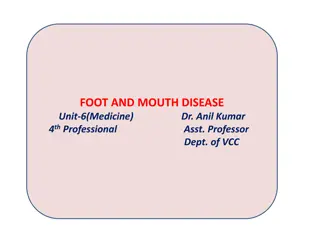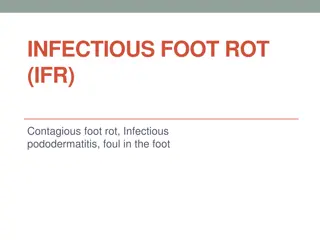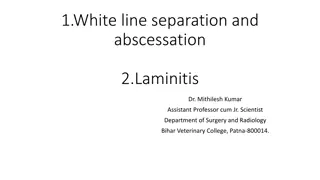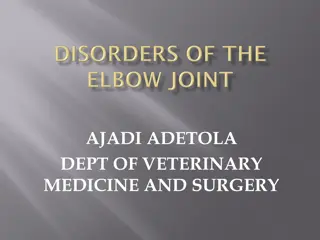Understanding Bluetongue Disease in Sheep, Cattle, and Goats: Causes, Symptoms, and Diagnosis
Bluetongue disease is a viral illness predominantly affecting sheep, with occasional cases in cattle and goats. Transmitted by insect vectors, it can lead to various symptoms such as catarrhal stomatitis, lameness, and reproductive issues. The disease's impact, transmission methods, clinical signs,
0 views • 8 slides
Understanding Azoturia in Horses: Causes, Symptoms, and Treatment
Azoturia, also known as exertional rhabdomyolysis or tying-up syndrome, is a multifactorial myopathy that mainly affects draft horses. It is characterized by stiffness in gait, reluctance to move, lameness, and myoglobinuria. The disease typically occurs during exercise after a period of rest and ca
0 views • 14 slides
Understanding Foot and Mouth Disease in Animals: Causes, Symptoms, and Management
Foot and Mouth Disease is an acute, highly contagious illness affecting cloven-hoofed animals, causing vesicles and erosions in the mouth, nose, teats, and feet. The disease is caused by a positive sense, ss-RNA virus with various serotypes. Transmission occurs through inhalation, direct or indirect
0 views • 8 slides
Understanding Foot-and-Mouth Disease (FMD) and Bovine Viral Diarrhea (BVD)
Foot-and-mouth disease (FMD) is a highly contagious animal disease affecting cloven-hoofed animals, while Bovine Viral Diarrhea (BVD) is a serious cattle disease caused by the BVD virus. FMD is not transmissible to humans and is caused by different strains of Aphthovirus. Symptoms of FMD include ves
0 views • 12 slides
Understanding Foot Rot in Sheep: Causes, Transmission, and Clinical Findings
Foot rot is a contagious disease in sheep caused by anaerobic bacteria. It leads to lameness and economic loss. This article discusses the etiology, classifications, epidemiology, transmission, pathogenesis, and clinical findings of foot rot in sheep.
0 views • 13 slides
Comprehensive Overview of Infectious Foot Rot (IFR) in Ruminants
Infectious Foot Rot (IFR) is a contagious disease affecting ruminants worldwide, characterized by severe interdigital dermatitis and lameness. It is caused by Fusobacterium necrophorum and other bacteria, leading to inflammation of the sensitive foot tissues. Various predisposing factors and modes o
0 views • 13 slides
Understanding White Line Disease and Laminitis in Veterinary Medicine
White line disease is characterized by wall separation with cavity impacted by mud or abscess formation, leading to lameness in animals. Treatment involves trimming, drainage, and antibiotic therapy. Laminitis is inflammation of the pododerm, causing acute pain, lameness, and hoof abnormalities. Pre
0 views • 11 slides
Understanding Solar Ulceration in Cattle
Solar ulceration is a circumscribed reaction in cattle affecting the pododerm, characterized by erosive defects. It is often linked to excessive weight-bearing and abnormal claw conditions. Signs include lameness and exposure of sensitive tissues, with treatment involving trimming, wound care, and a
0 views • 8 slides
Understanding Elbow Joint Disorders in Veterinary Medicine
The elbow joint is a true diathrodial joint formed by the articulation of various structures. Disorders such as elbow luxation, un-united anconeal process, and fragmented coronoid process can lead to lameness and other clinical signs in animals. Causes include osteochondritis dissecans and trauma, w
0 views • 16 slides








